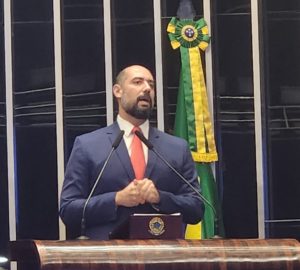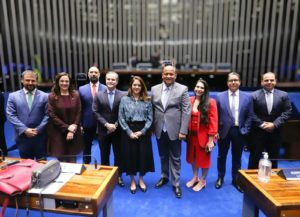 This Tuesday (11/06), the Federal Senate hosted an important plenary session on the regulation of Artificial Intelligence (AI) in Brazil, called by Senator Eduardo Gomes (PL/TO). The event was attended by Marcelo Almeida, Director of Government Relations at the Brazilian Association of Software Companies (ABES), who made a significant contribution to the debate.
This Tuesday (11/06), the Federal Senate hosted an important plenary session on the regulation of Artificial Intelligence (AI) in Brazil, called by Senator Eduardo Gomes (PL/TO). The event was attended by Marcelo Almeida, Director of Government Relations at the Brazilian Association of Software Companies (ABES), who made a significant contribution to the debate.
Marcelo Almeida began his speech by recognizing the complexity involved in regulating AI. Highlighting the evolution of the bill since its origins in the Chamber of Deputies, he underlined the importance of a balance between rights, duties and obligations with incentives for technological innovation. “It is essential that regulation is not excessive to the point of slowing down technological advancement“, warned Almeida.
Furthermore, the ABES director pointed out the challenges faced by the technology sector in Brazil. Among the main obstacles mentioned are tax problems, a shortage of qualified labor and excessive regulation. According to Almeida, “To boost the country's growth, it is urgent to encourage innovation, technological development, professional training and digital literacy“.
 Another crucial point addressed was the protection of workers' rights, especially the most vulnerable, and the issues of gender and racial bias in the implementation of AI. Marcelo Almeida expressed concern about the negative impacts that excessive regulation could have on translation systems and copyright works.
Another crucial point addressed was the protection of workers' rights, especially the most vulnerable, and the issues of gender and racial bias in the implementation of AI. Marcelo Almeida expressed concern about the negative impacts that excessive regulation could have on translation systems and copyright works.
Finally, Almeida emphasized the need to create spaces for innovation for the development of AI in Brazil. He highlighted the importance of the regulatory sandbox concept and the need for mechanisms that promote digital inclusion and reduce social inequalities. “ABES is committed to contributing to making Brazil more digital and less unequal through more appropriate regulations “, he concluded.
The plenary session in the Federal Senate ended with the realization that there are still many challenges to be faced in approving the bill on AI, but also with the certainty that open dialogue between the government, private sector and civil society is the way forward for a balanced and effective regulation of Artificial Intelligence in Brazil.













